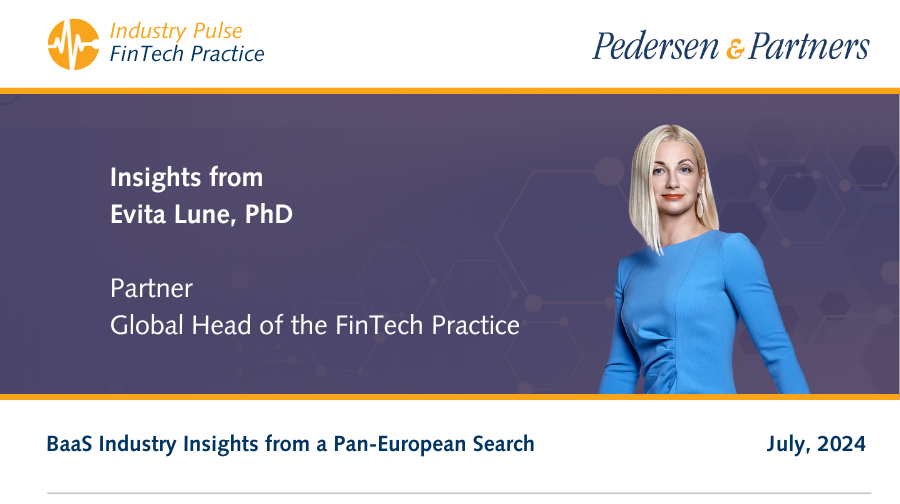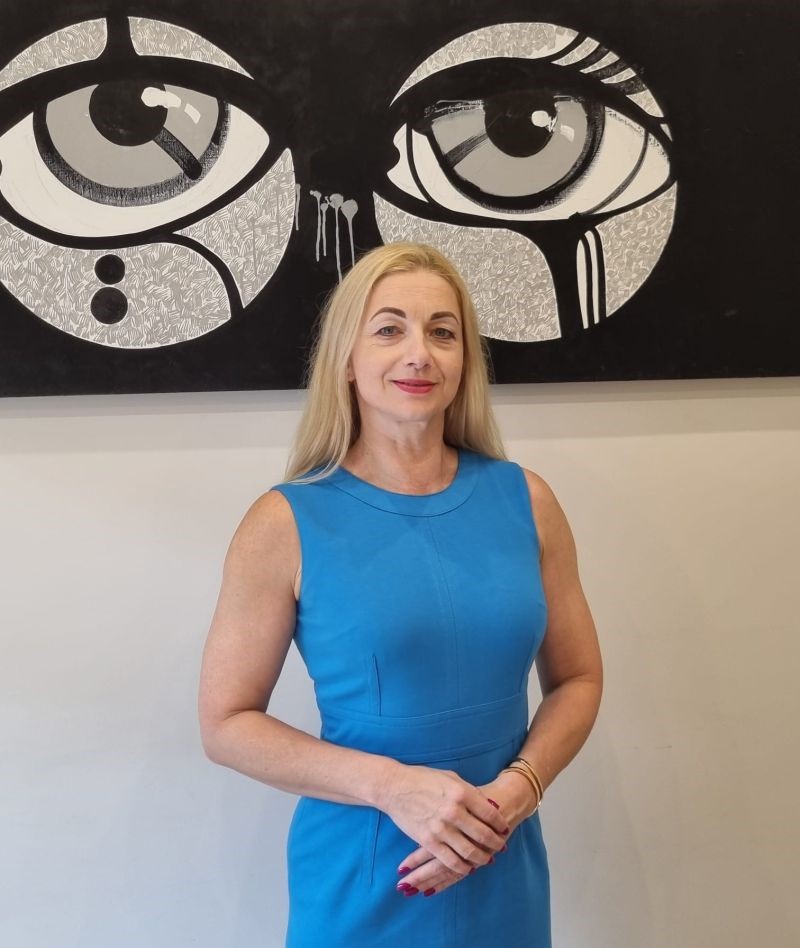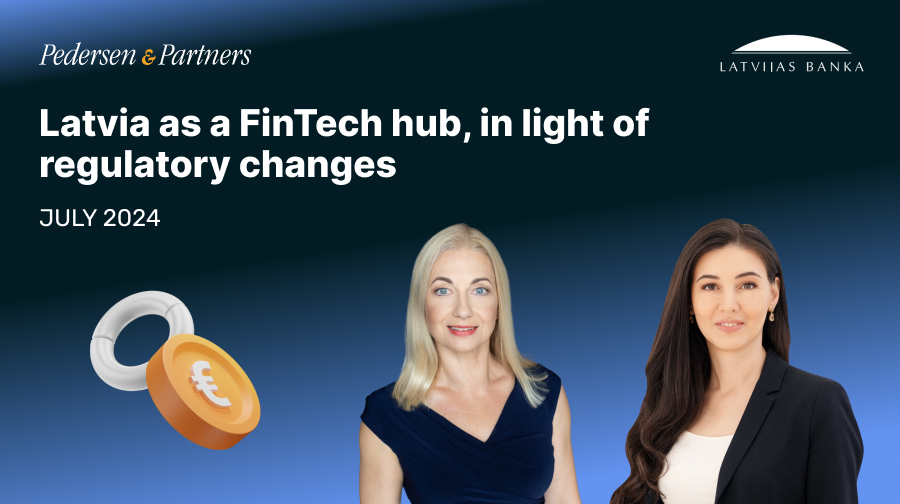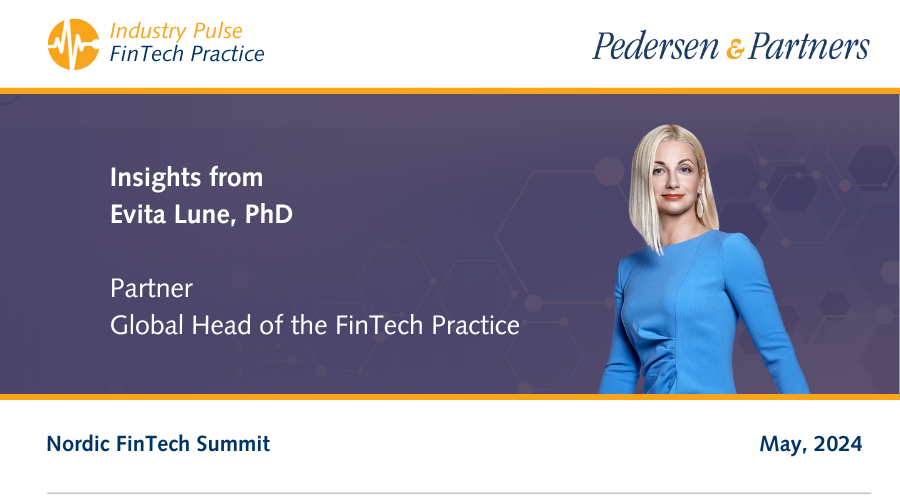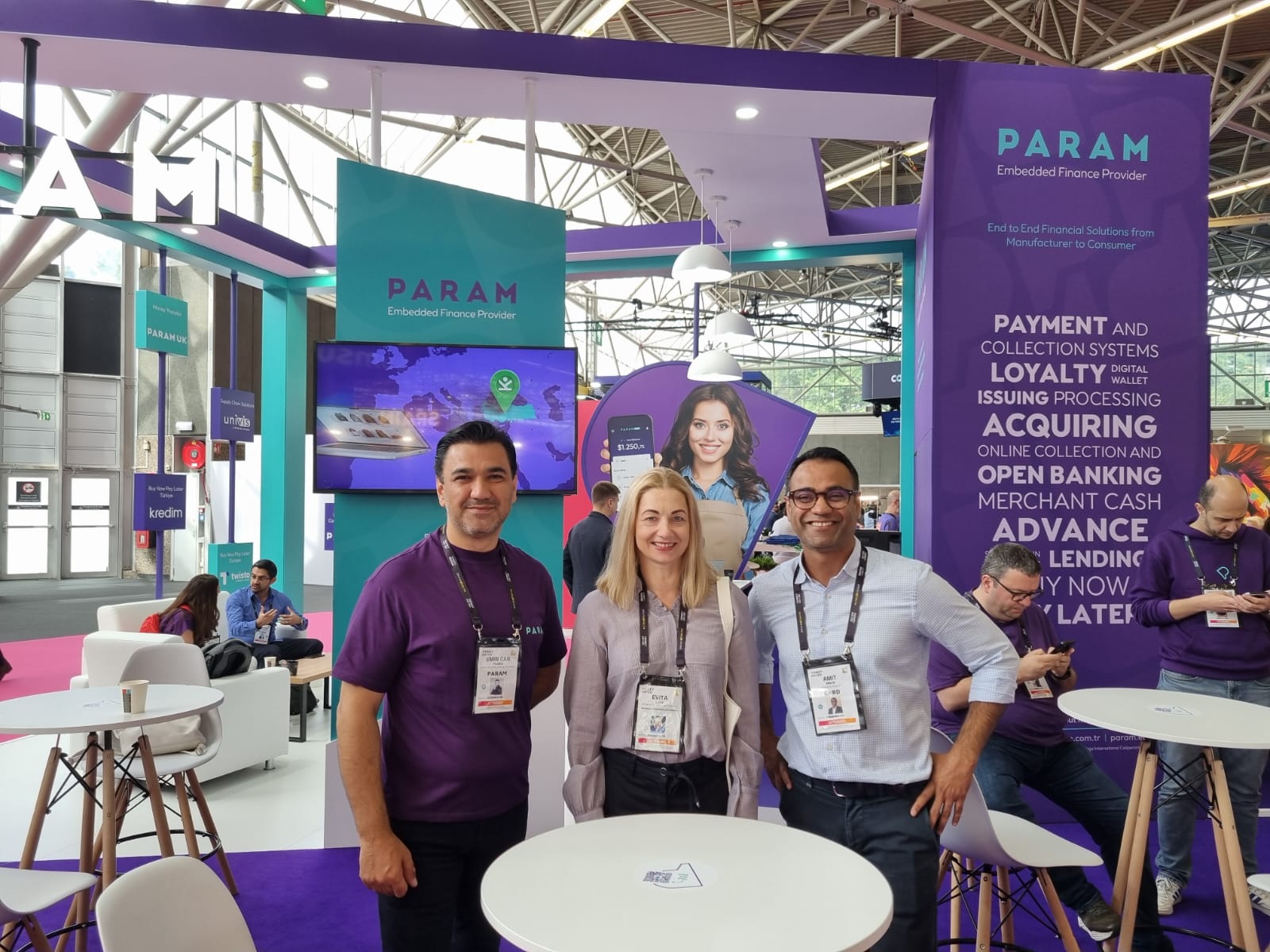By Evita Lune, PhD, Partner, Global Head of the FinTech Practice at Pedersen & Partners:
I have been impressed by dynamic and proactive work that Marine Krasovska, Head of the Financial Technology Supervision Department at Latvijas Banka, has been doing with the FinTech community in recent years. Therefore, I am very thrilled to have the opportunity to interview her about recent developments in the regulatory landscape in the European Union (EU) and Latvia in particular.
Evita: How attractive is the Latvian regulatory environment for FinTech firms? What type of companies would you recommend choosing Latvia as a licencing hub?
Marine: Latvia can be proud of its strong compliance culture and predictable legal framework, which foster innovations and customer protection. A licence issued by Latvijas Banka authorises a financial market participant to work and provide services in every EU Member State. 🏦Supportive regulatory regime provides guidance, helping firms navigate regulatory requirements efficiently. To enhance FinTech development, FinTech supervision departments were established in 2020, staffed with dedicated experts specialising in financial innovation. 📈
🛠️ In order to facilitate the development of the FinTech market, the Ministry of Finance implements a FinTech strategy, aimed at encouraging the development and adoption of new financial technologies and services to enhance the competitiveness of the financial sector. Latvijas Banka introduced special tools: the Innovation Hub and Regulatory Sandbox, and later added pre-licensing assessment. It is an opportunity for potential market participants to receive valuable guidance and recommendations already during the document preparation stage, thereby strengthening their quality and reducing the time for subsequent licencing.
💰Latvia offers competitive corporate tax rates and other tax incentives for start-ups and tech companies, making the country financially attractive for FinTech companies. Latvia also has one of the best regulation for start-ups: start-ups in Latvia may receive state aid. The aid programmes and their granting criteria are defined by the Law on Aid for the Activities of Start-up Companies. One of the types of support allows start-ups to reduce their labour costs. There are two support mechanisms available: the option to pay a fixed social tax per employee and exemption from personal income tax, or obtaining 45% co-financing for the remuneration of highly qualified workers. 📈 In addition to this, there are company capital share purchase rights available for employees. Granting the right to purchase capital shares is a bonus system designed by companies to attract and motivate employees. This is a valuable tool for young and ambitious FinTechs. The right to purchase capital shares, or share options, enables employees to acquire shares of the company at nominal price or free of charge after a specified period of time, irrespective of the current fair market value of the shares. The employee has the opportunity to realise shares and capitalise on any increase in the company's value. Another tool is the start-up visa, which enables non-EU founders of start-ups to travel visa-free throughout the Schengen area and obtain a certified e-signature.
💼Latvia boasts a highly educated workforce renowned for its strong skills in IT, compliance, and finance. The availability of skilled professionals is a significant advantage for FinTech firms seeking to develop and expand their operations.
Evita: As a member of Holland FinTech I have heard a lot about current and upcoming regulatory changes in the EU. How do you see the FinTech ecosystem to evolve in light of the new European regulatory environment: Instant Payments Directive, MICA, AI Act, PSD3, DORA, etc. Please share the impact on business from each of them.
Marine: Certainly, MiCA, DORA, PSD3, and FiDA, alongside emerging technologies like blockchain, AI, are creating new opportunities.
🔒Until now, the EU lacked a unified legal framework for the crypto-assets industry. The new regulation establishes common conditions for companies across the EU, addressing gaps in national regulations that cause market fragmentation. This will create an environment conducive to developing a larger EU crypto-assets market and fully utilising the EU's internal advantages. MiCA aims to foster the growth of the crypto-asset sector in Latvia. It applies to those involved in issuing, offering, trading, or providing services related to crypto-assets. Financial market participants will need a licence from Latvijas Banka, valid throughout the EU.
🛡️ In addition to opportunities, MiCA also presents significant challenges for companies to comply with regulation and navigate the comprehensive and complex requirements. This may led to industry consolidation at EU level, providing better quality of business models and corporate governance. The market has to ensure robust cybersecurity measures, data protection practices, customer protection, and financial stability to meet standards. Starting from January 2025, Latvijas Banka will be able to issue licences for operations under MiCA. Now is the right time for companies to adapt their business models and operations to align with the new regulatory framework, which may involve substantial changes in organisational structures, management, business processes, and investments, especially in compliance related to the field of ML/TF. Companies have to demonstrate strong organisational capabilities, adequate knowledge, skills and expertise to perform functions to ensure sustainability.
🌐 DORA is another regulation that will apply to financial institutions starting from 17 January 2025. It aims to harmonise and consolidate regulatory ICT requirements across the EU, enhancing financial institutions' ability to manage ICT risks, mitigate cyber threats, and improve their cybersecurity capabilities. The main focus of the DORA regulation is centred on four areas: ICT risk management framework, ICT incident reporting, digital resilience testing, and ICT third-party service provider risk management. Key challenges in implementing DORA include ensuring compliance with rigorous cybersecurity and operational resilience requirements. Market participants have to allocate adequate resources, investments in technology and skilled personnel to address cyber threats. Readiness for DORA is affected by the lack of IT industry professionals on the market and variations in the maturity of management process capabilities among market participants.
⚠️ In the financial industry, cybersecurity is crucial, as it safeguards business data and assets. Currently, financial institutions in Latvia are prime targets for cyberattacks, which can result in significant financial losses, reputational damage, and legal liabilities. AI-powered cyberattacks are an emerging threat in the global cybersecurity landscape. Weak cybersecurity can result not only in data breaches, business disruption, and loss of authorisation, but also affect the stability of the entire financial system.
📊 The cloud infrastructure and outsourcing services are widely used in the financial sector. As the banking sector is being digitised, its reliance on third party providers still grows. Within the existing regulatory framework, certain IT outsourcing risks are not managed effectively enough. The DORA introduces stricter standards, and the European Supervisory Authorities will supervise the external critical service providers for the EU under the DORA.
🤖 The European Commission has approved the AI act to address the risks and opportunities that AI can bring. The aim of the regulation is to improve the application of AI in the internal EU market and to ensure legal clarity and a solid foundation for the use of human-centered and trustworthy AI. The regulation should also ensure that the fundamental rights are protected and technology is used in a highly secure manner. It not only harmonises the rules for the deployment and use of AI systems in the EU but also defines prohibited applications of AI and lays down specific requirements for high-risk AI systems as well as obligations for the operators of such systems.
💳 The PSD3 sets out more extensive SCA regulations and stricter rules on access to payment systems and account information. The aim of the regulation is to protect the consumer rights and personal information while improving competition in the payments industry. To enhance the regulatory framework for payment services, the provisions of the PSD2 and the E-Money Directive will be merged into the PSD3. Under these provisions, e-money institutions will formally cease to exist and will be referred to as payment institutions. Among a range of other services, they will still be able to issue e-money.
🔓 To support innovation in the financial services sector and to improve the control of the EU customer data, the FiDa/OpenFinance proposal was drafted. It aims to develop open finance by stipulating requirements and creating incentives for data holders to share data in an efficient and standardised way. At the same time, customers would retain control over their data, and their data privacy and safety would be preserved. This should simplify the process of opening financial accounts and promote more personalised financial services, based on the shared data, and so access to and availability of the financial services would improve overall.
Evita: As we are working with global executive search projects on a daily basis, I could characterize our Fintech talent pool as exceptionally strong – we have young C level executives, who have achieved a lot in their late 20ies/ early 30ies already and a dynamic career in a global scale up with a global hub out of Riga is a more desired growth path for most talented candidates as opposed to a classic corporate career. Would you agree with the argument that the small size of our country has pushed us to be very entrepreneurial and ambitious, develop global business models and advanced technology?
Marine: The entrepreneurial spirit and ambition of our financial industry professionals has been affected by the small size of Latvia. So far, fintech entrepreneurs have mostly focused on innovations and looked beyond national borders to achieve growth. 🌍 Such practices can be observed on investment services platforms as well as in lending and consumer financing. These segments are characterised by large international market participants and fierce competition both on the European and global scales.
💼 Historically, financial and IT experts emerged in the early phases of the financial industry's growth cycle. As a result, young experts had the opportunity to take on greater responsibilities and were exposed to more challenges to overcome and learn from. Every such challenge served as an accelerator and prepared talents for leadership roles faster than it would have been possible in larger countries where experts have followed the same path for many years and even decades. These experts were born into C-level executive roles. Any Latvian FinTech company should have a global mindset and outlook taking into account the dynamics of emerging technologies, development of innovations, changes in the generational and customer preferences.
🏫 In this sense, Latvia is a fantastic place where a FinTech company can grow, test business models, hire top-tier talents and scale the business across the EU and beyond. Over last three years, the educational system has provided a solid foundation for the development of advanced technologies, launching new practical programs oriented on entrepreneurial FinTech business (RTU and RBS). Due to the rapid digitalisation of public and private sectors, FinTech companies encounters challenges with covering the gap in the talent pool as well as attracting young professionals and retaining them within the organisation. In contrast to the classical education that provides solid foundation for employees, the companies are increasingly seeking specific skills and value them higher than the formal education. Latvia offers excellent environment for acquiring these skills with strong emphasis on practical and hands-on learning to support continuous professional development. Even with limited talent resources, young entrepreneurs are compelled to think creatively and develop internationally competitive cutting-edge financial solutions. In this way, the challenge of limited resources becomes a catalyst for achievements and entrepreneurial success in the FinTech industry. Companies are focused not only on attracting young talents and surviving but also on retaining, mentoring and developing their leaders which allows them to build competitive and sustainable business models.
🚀 Concluding remark from Evita:
We all know Latvia is a small market, but our FinTech entrepreneurs have managed to turn this objective drawback into an advantage and have developed some of the most impressive and fast growing Fintech companies in the world. 🌍 Mintos, 4finance, Sun finance, Eleving, AvaFin are just a few examples. Latvian Regulator, as demonstrated by an example of Marine has been very open, accessible, proactive and welcoming for new business models and creation of a Fintech startup friendly ecosystem. In light of new and changing regulatory landscape and yet tightening cooperation among EU states in light of global geopolitical developments, choosing a strong and supporting EU hub in Latvia is advantageous and often an overlooked opportunity.
🌟 Concluding remark from Marine:
📈 Latvia has taken significant steps towards establishing a supportive regulatory environment for the FinTech industry. Our strong compliance culture, competitive tax incentives, and highly educated workforce make Latvia a compelling choice for FinTech companies looking to operate within the EU. The recent regulatory changes in the EU, including the MiCA, DORA, PSD3, and the AI Act, are set to transform the FinTech landscape, creating new opportunities while also posing compliance challenges.
🛡️ The introduction of a proactive approach, such as pre-licensing assessments and support mechanisms for start-ups, has fostered a thriving entrepreneurial spirit. This environment is still new but ambitious, with professionals who are prepared to take on leadership roles in a dynamic and innovative market. Latvia continues to invest energy and resources in digitalisation and technology to preserve an attractive hub for the FinTech companies aiming to scale their operations across Europe and beyond. The combination of regulatory foresight, talent development, and a robust support system positions Latvia as a leading player in the global FinTech ecosystem. 🌍


